Actors & Artists
On display this week: Erin Somers, Sarah Weinman, Colin Dickey, Kendall Storey, Gabriella Paiella, Sarah Leonard, Tara Isabella Burton, Peter Kingsley, James Marsden (not the actor), Jordan Castro, Nate Freeman, Mark Jacobson, Steve Earle, Steven Levy, Rachel Handler, Marc Tracy, Melissa Flashman and many, many more…

Photo by Scott Stanger
New York may never see a snow with staying power again, but the stuff of life remains undaunted even in, as of yet, an unseasonably warm winter.
OUT AND ABOUT
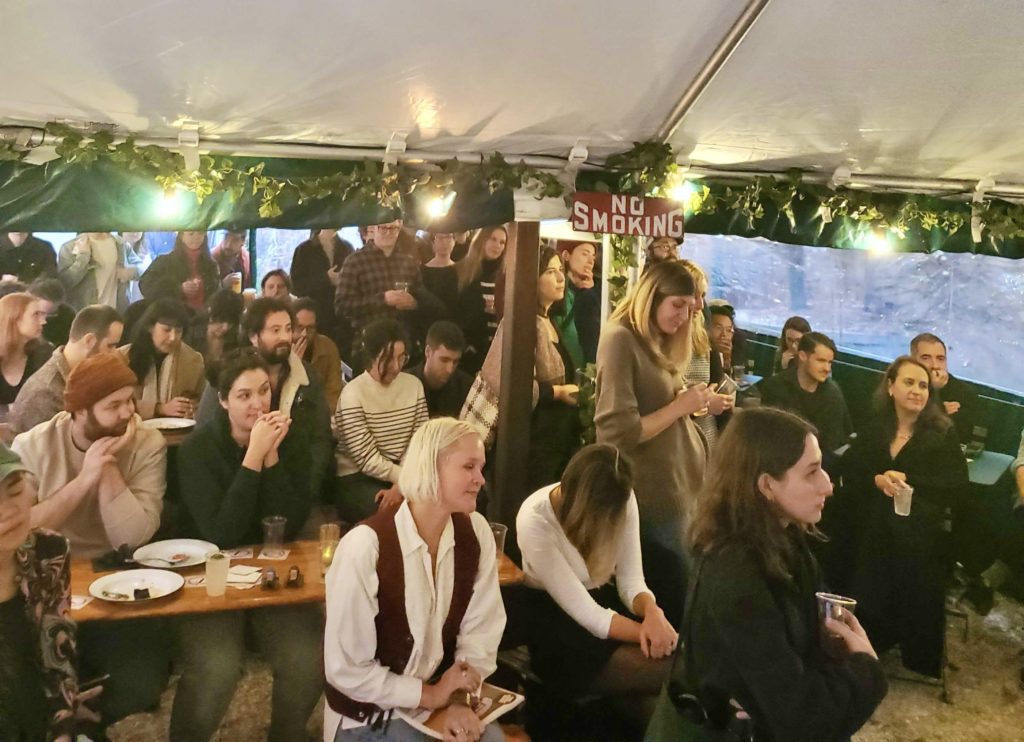
In a heated tent in the backyard of Threes Brewing in Gowanus, Still Alive, the magazine about people and other entities that are shockingly still with us, celebrated its first two issues on Saturday, December 9. Ironically, or perhaps fittingly, the magazine was started with an inheritance. “My father’s sister lived a sort of isolated life. We didn’t even know her that well,” founding editor Erin Somers, whose day job is reporting for Publishers Lunch, told The Fine Print. “When she died a few years ago, she left us a house, which we weren’t expecting. It wasn’t a ton of money. So we were like ‘What would be a life-affirming thing to do?’ A good use of this money is to put it towards a beautiful art object and a testament to being alive. So that’s what we did. And when that money runs out, we’re done. This has always been the idea.” For the most part, she’s kept the magazine in the family. Erin’s sister, Bailey Somers, is the publisher, her other sister, Molly Somers, handles the design, and her brother-in-law, James Barnes, oversees the website. “None of us are doing this as a careerist endeavor, and it sort of becomes a bummer when it becomes careerist,” Erin explained. “We want it to be the opposite of a bummer.”
How many more issues can Still Alive afford? “I don’t know. We definitely are gonna do an issue three because [managing editor Nicholas Russell] already lined up someone who is too good — a legendary writer has submitted a poem. It’s like, ‘Oh fuck, we have to do issue three.’ So perhaps as long as awesome people still want to contribute,” Somers said. The logistics don’t just come down to how long the money lasts. “We have to make this calculation with every issue. In the first issue, the poet Charles Simic contributed some poems and passed away. It was like, ‘Well, what do we do with you?’ So we introduced having an in memoriam section in the back,” she said. “That’s a hazard of this very silly premise. You’re racing the clock.”
Under the tent, contributors who could relax, having beat the reaper to publication, regaled the audience with tales of ancient wonders. Jeremy Gordon, author of the forthcoming novel See Friendship, read about Australian tennis player Margaret Court; New York Times crime book columnist Sarah Weinmanevoked comedian Bob Newhart; former Astra deputy editor Samuel Rutter reminded everyone of the Argentinian musician Charly Garcia; Pitchfork contributor Linnie Greene read about New Age zither virtuoso Laraaji; Washington Post contributor Robert Rubsam went a little more material with Dischord Records; former Boston Globe senior audio producer Amy Pedulla dug the band The Ex-Lion Tamers; former Gawker news writer Fran Hoepfner sketched conductor Herbert Blomstedt; and Morbid Anatomy Museum co-founder Colin Dickey stomped up underground polka.
Among the attendees taking in the readings were Catapult editor-in-chief Kendall Storey, novelist Brandon Taylor, Guernica senior fiction editor Adam Dalva, GQ senior staff writer Gabriella Paiella, Rolling Stone music editor Christian Hoard, former BuzzFeed News tech desk editor Mark Yarm, former BuzzFeed News visuals editor Kenneth Bachor, Publishers Weekly senior news editor John Maher, The Millions editor Sophia Stewart, and Washington Review of Books editor Chris McCaffery.
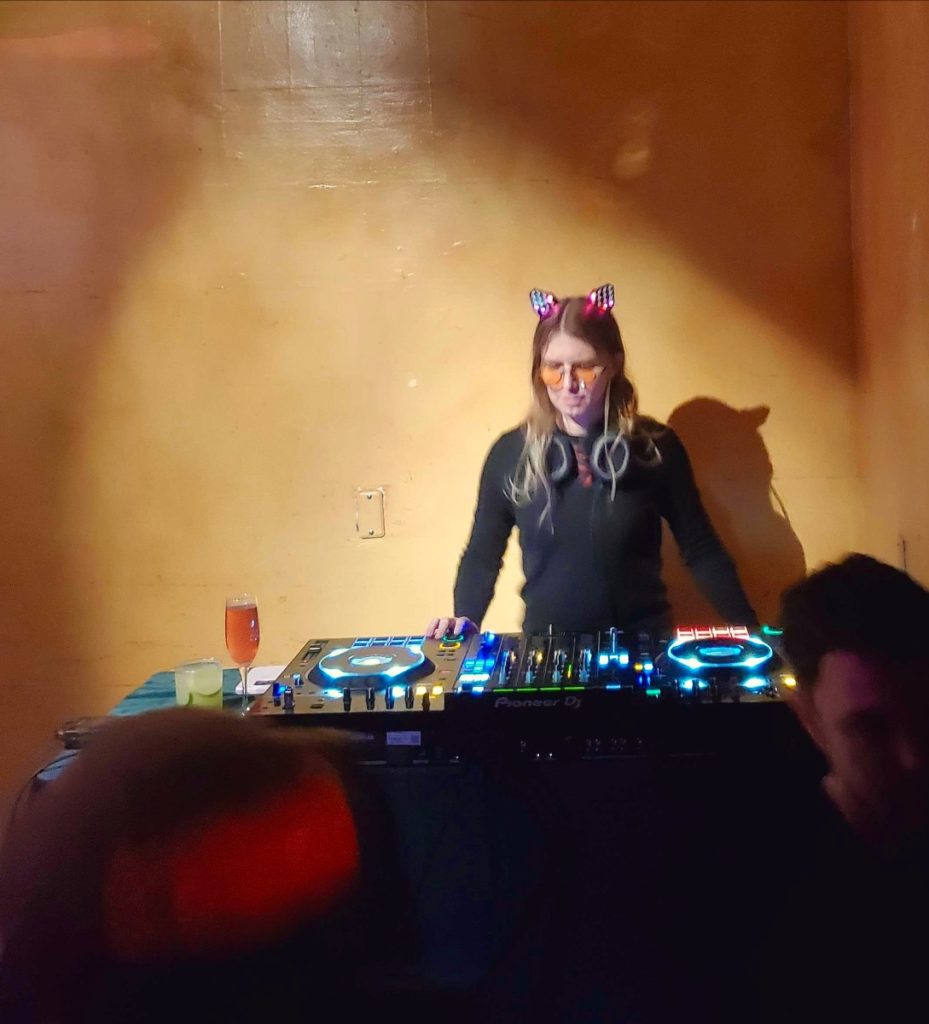
Chelsea Manning at the turntables on New Year’s Eve.
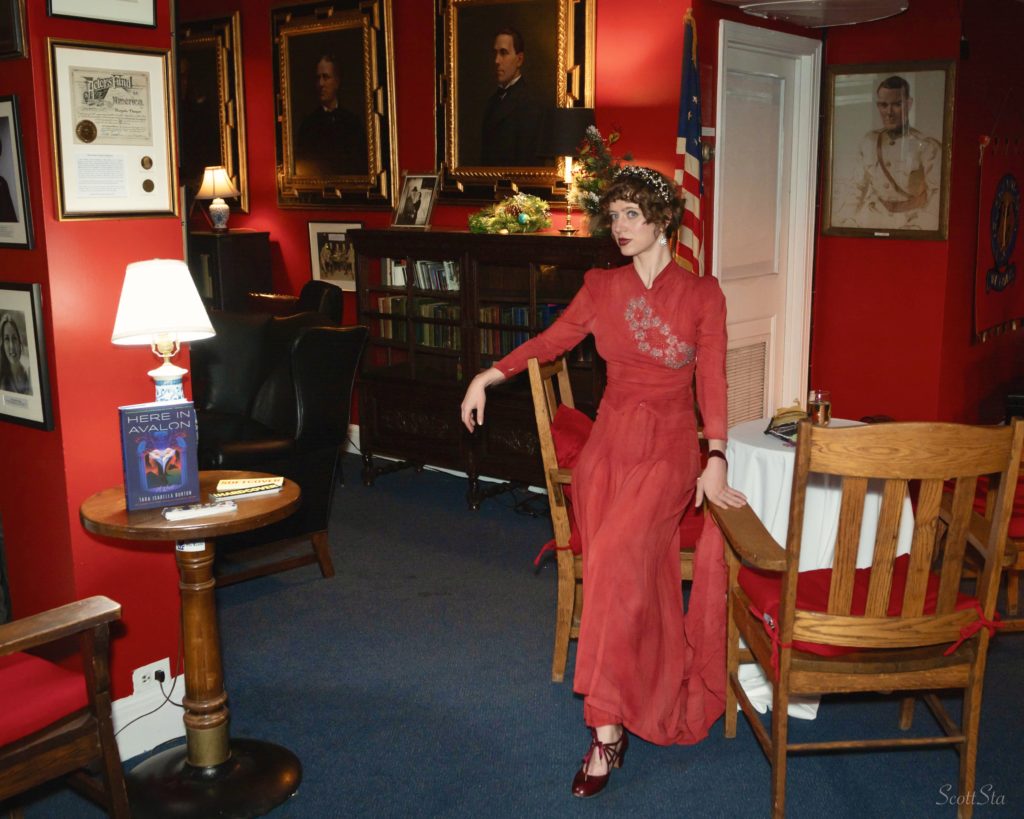
Photo by Scott Stanger
Former Vox religion reporter Tara Isabella Burton’s Here in Avalon is a novel about that feeling “when a whole riotous group of beautiful people embrace you, as if they had been waiting for you their whole lives, as though you had ever been the kind of person worth waiting for. Even if you know it is almost certainly a lie.” It features a series of parties so enthralling that characters consider giving up the rest of their lives for them. (Sounds familiar.) So throwing a party to celebrate its release seemed like it must be daunting, but Burton was unflustered on the surface at The Lambs Club in Midtown on Friday, January 5. “This is the calmer of the two parties. The next one we have a sword swallower, a showgirl, a clown, and a fiddler. This one we only have a pianist,” she told The Fine Print. “Do you know this place? I’m a Lamb. [Algonquin Round Table historian Kevin C. Fitzpatrick], who’s over there is the Shepherd, the president. All the titles are Lamb puns.” She pointed to a painting near the elevators which featured a fading figure. “I like that painting because the guy is a ghost. I think it might just be unfinished,” she said. “There used to be a collection of speakeasy passports from the ‘20s, when you’d need to present them to get into speakeasies. They put that in storage.”
Longtime Lamb Peter Kingsley, who understudied Mozart in the original Broadway cast of Amadeus, explained with a theatrical trill that the club “was founded in 1869 in London, England by 12 gentlemen. Well, 11 gentlemen and one actor.” Though they were long dead by then, it was named after Charles and Mary Lamb. “They were brother and sister, and they were forced to live together by law because Mary, who was subject to fits, stabbed her mother to death with a kitchen knife,” Kingsley said. “She was so ashamed of what she’d done, they got together and wrote Tales from Shakespeare,” an adaptation for children. A spore from the English club drifted to New York in 1874 and sprouted in the irrepressibly growing metropolis’s theater community. “They were knocking down the doors to join because actors couldn’t get married at a church in those days. Join a club? Get out of here,” Kingsley said. “Up until like the Second World War, anyone who was anyone was a member,” noted new inductee James Marsden (not the actor), whom Burton introduced to his now-wife Alex Brinkman-Young, a high school friend when they were at Oxford. He wore what he’d been told might be a British Naval Academy drummer’s jacket.
“We still have actors, we still have performers, mostly a lot of singers,” Kingsley said, making a face. “They’re not very good. It used to be all Broadway people. Now, I was on Broadway, so I guess I’m a Broadway person, but it’s changed. How do you drag a 19th century club into the 21st century? You have things like this with Tara Burton and people coming in. Apparently, your generation likes to dress up and pose and make Instagram shots,” he told The Fine Print and then quickly added, “Well, not you.”
Burton’s party attracted an eclectic and extravagantly dressed bunch — both members and not. “It’s the intersection of vintage weirdos, Christian weirdos, and literary weirdos,” Burton explained. Among them were the night’s piano player Chris Johnson and Sarah Weinman (a veteran of book parties with piano players: “Maria Konnikova had a book party, I think it was for her second book The Confidence Game. It was hosted at a friend’s house, and late in the evening Christopher Cerf, Bennett Cerf’s son who also did music for The Electric Company and Sesame Street, started playing selections. I distinctly remember people dancing along and one of them was Gary Shteyngart”), Plough editor Susannah Black Roberts, HarperCollins editor Hannah Long, Mysterious Bookshop staffer Julia O’Connell (who made an appearance in a recent Harper’s piece: “I may have been briefly mentioned not by name but as, ‘we walked past someone sitting at a desk’”), Burton’s mother in something like a tiger-print dress, her mother’s friends, and illustrator Ted Enik, who contributed to children’s books featuring Fancy Nancy and The Magic School Bus. “They all look like they could be children’s illustrators,” noted The Novelist novelist Jordan Castro.
In his giant beard, Castro looked nothing like a children’s illustrator (maybe a bit like Edward Gorey), but he and his wife Nicolette Polek — the author of the forthcoming novel Bitter Water Opera, who was expecting Phyllis Rose’s Parallel Lives in the mail any day now — weren’t total strangers to a clubby atmosphere. “We went to the Young Republican Club and saw a band called The Hillbilly Thomists, which is a bluegrass band of Catholic priests. They were good, but in the room we were in, everyone was wearing suits,” Castro said. Even the priests? “Cassocks,” Polek amended. They were planning to rectify their informality with J.Crew gift cards, for they weren’t quite comfortable in every ostensibly proletarian venue either. “I’m officially boycotting KGB [Bar],” Castro said. “It’s always crowded. I did a reading there and I was memeing about how it was gonna be called Castroworld, like Astroworld. And someone had a fucking seizure. I memed it into reality. So I was like, I’m never gonna go back. And then we tried to go the other night, stood there for five seconds, and it was just confirmed. But I found $20 on the ground when we left. So it was a good omen. I was rewarded for leaving immediately. It’s the worst place in the world.”
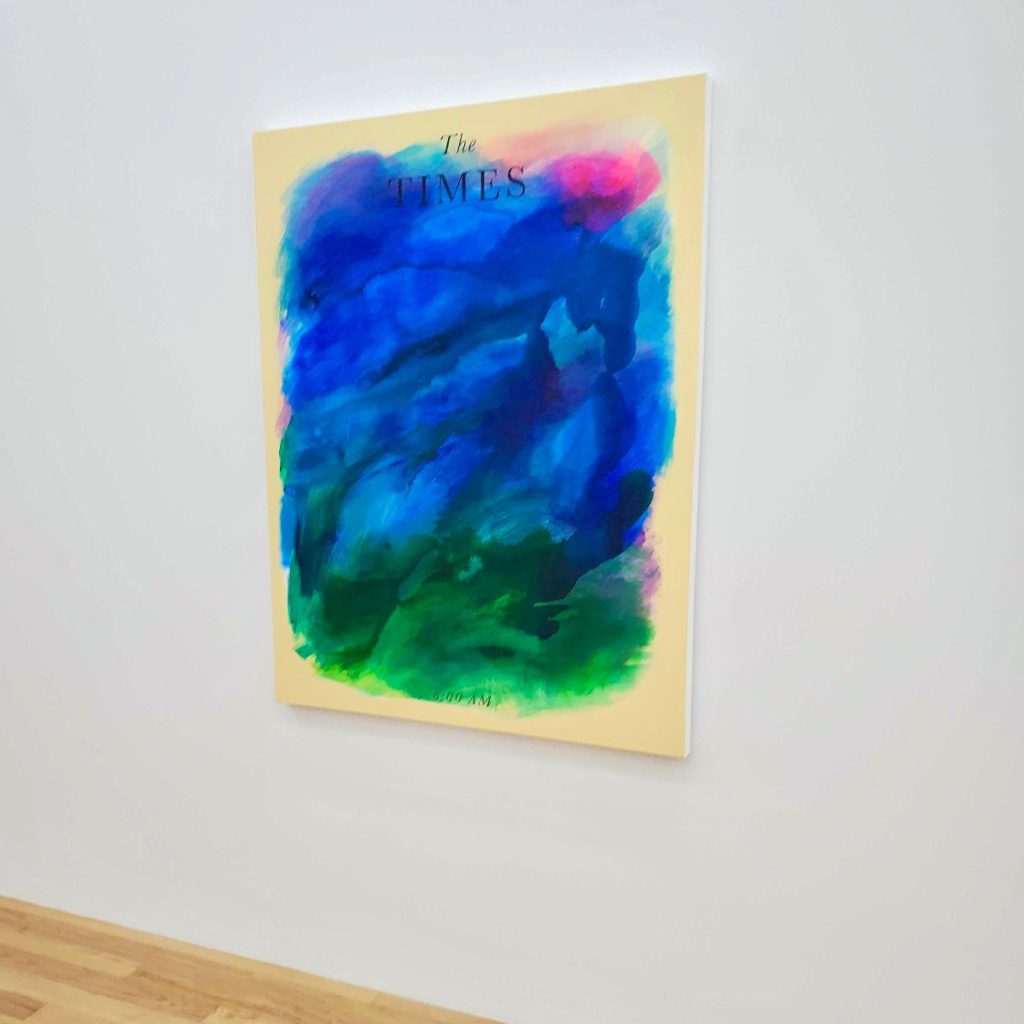
Painting by Andrew Kuo
On Monday, January 8, Broadway Gallery in Tribeca hosted the opening of their new exhibit, “Friends of the Pod,” curated by the hosts of the art world podcast Nota Bene. Co-host and Vanity Fair culture correspondent Nate Freeman, wearing a restrained tweedy jacket, greeted attendees as they walked in. As one of New York’s most dogged art world reporters, how did it feel to be on the other side? “Not something I ever thought I would do, necessarily, but the podcast is its own beast,” he told The Fine Print. “When they asked us to put a show together based on what the podcast means to the art world, and what we talk about, it was a pretty natural thing.” Were there any nerves around how working with a gallery and artists in this capacity would affect his reporting? “No. Like I said, the podcast is its own completely separate thing.” Was he expecting anyone else from Vanity Fair to make an appearance? “If they listen to the podcast.”
“It’s been a long ride to get this show up on the walls,” Freeman’s co-host, private art advisor and curator Benjamin Godsill, explained on a recent episode of Nota Bene. “I think we first had dinner maybe close to a year ago in the Odeon, around the corner. You guys had some martinis, we had some french fries, I forget what else we ordered. It was a good dinner. We decided we would do it in January 2023, and then we sat on our asses and didn’t do a fucking thing until September or October this past year. And here we are, and it looks great. It all worked out.” Bringing them in was an experiment and a leap of faith for Broadway Gallery too. “This is the first hired gun situation that we have undertaken,” said co-owner Pascal Spengemann on the episode. “Never say no,” said Godsill. “That’s my credo.”
The Fine Print stuck around just long enough to give the art a good stare. Standouts included a cracked sandstone phone by Matt Johnson, a horizontal bust resembling a Greek philosopher with half an eggplant and celery stalks balanced on it by Tony Matelli, a still life with oysters by Hilary Pecis, and a painting by Andrew Kuo that blares out “The Times.” It didn’t seem like a strain to relate those back to the content of the podcast. We didn’t spot any other Vanity Fair staffers, but New Yorker staff writer Naomi Fry and GQcolumnist and How Long Gone podcast co-host Chris Black walked in within the first ten minutes.
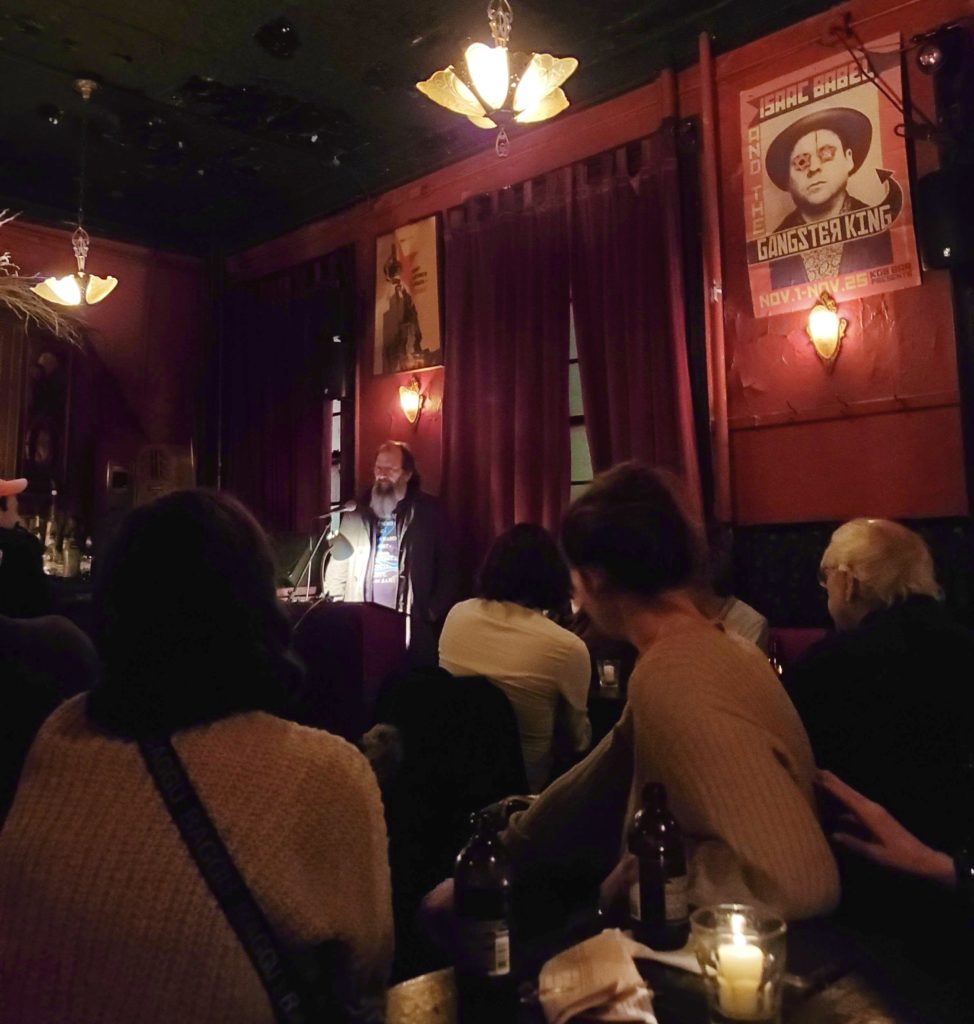
The following night, Freeman faced down driving rain to make it to Castro’s hated KGB Bar for the first edition of the 31st year of the bar’s legendary journalist reading series. Co-hosts New York magazine veteran Mark Jacobson and New York Times Sunday business editor Noreen Malone had wondered whether they’d have to announce that the evening had been rained out. “I was asking Mark if he thought we should cancel,” Malone told The Fine Print. “He basically called me a millennial wimp.” Jacobson initially seemed to concede her point in his introductory remarks to the somewhat thinned crowd. “It’s not a fit night out for men or beasts, so they say on the Weather Channel. They’ll drive you crazy with everything they say,” he said. “It’s a reasonable concern, you know, I just think it’s stupid.”
The rain wasn’t going to keep Jacobson from a somber duty. “The other night, I got a phone call from Judy Jensen, the wife of Terry Bisson, who was my first co-host, who began this venture with me back in 1992,” he told the crowd before any of the readings. “Terry wasn’t doing so good. In fact, he couldn’t even talk on the phone, but in case he checked out he wanted me to say something about him to the current KGB audience, tell them how much he loved them, even though some of them probably weren’t even born when we started doing these shows all the way back 30 years ago. Kind of a pre-eulogy, Terry said. So here it is: Terry was a funny guy to co-host a journalist reading series since he wasn’t a journalist. Not for a living anyhow. He was a science fiction writer, author of dozens of stories and novels set sometime in the future, or on other planets. Some of them became famous, even classic, like his story ‘They’re Made Out of Meat,’ which features some highly evolved aliens discussing the human race.” Bisson’s aliens would have seen how short the distance between the endeavors of scribbling meatsacks really was. “Terry said it wasn’t so strange for a left-wing sci-fi writer to be the host of a journalist reading series,” Jacobson said, “because if journalism was supposed to be the first draft of history, what was sci-fi other than the first draft of potential truth?” Bisson died early the following day.
Country songwriter Steve Earle — whose “Copperhead Road” was made an official Tennessee state song last year — held that somber tone in the intro to the first reading. “This is from a memoir that I tried my best not to ever write in my life. Had no interest in writing it. I just needed money really badly, mainly because I’ve gotten married a lot and it hasn’t turned out all that well. I was in another one of those crises, so I finally agreed to write a memoir,” he said, prefacing a selection from the unfinished book. “I decided to make it into a book about recovery and then I worked on it for years. Then I lost my oldest son to an overdose of fentanyl three years ago. He had the same disease that I had, and he didn’t survive it. So I couldn’t keep working on this book with that, because it becomes a different book now. I intend to finish it, but I’ve put it aside.” Then he read a section from the depths of his addiction that elicited horror and surreal laughter and left the audience quoting evocative lines to each other during the intermission. After reading, he hugged Jacobson and beelined for the door.
The following readers leaned into the humorous notes Earle and Jacobson found in the darkness. Malone introduced Wall Street Journal “Science of Success” columnist Ben Cohen. “He’s reading something different,” she said, “but it’s also about a kind of rock bottom and coming back from that.” The rock bottom turned out to be the old LaGuardia airport, and the recovery turned out to be its rejuvenated Terminal B. His column managed to cram in references to both Mad Men and The Sopranos. Cohen was followed by Wirededitor-at-large Steven Levy, who read a response to Marc Andreessen’s “Techno-Optimist Manifesto”and a selection from his 2007 book about the creation of the iPod. The final reader, New York magazine features writer Rachel Handler, got the most laughs with an essay on trying to get a martini to go from Nobu, in emulation of Robert De Niro’s former assistant.
Before and between the readings, attendees compared notes on their holidays. Jacobson had kept things quiet. “I had a great New Year’s Eve. I went to bed at 10:30. I’ve seen a New Year many, many times. I’m 76 years old,” he said. “Usually, I’d go to bed at ten in the morning.” Malone had a more eventful time. “My holidays were good except for the stomach flu that my whole family got. It was Christmas Eve. My son started vomiting. And then within the next 48 hours, my little nuclear family and my brothers and sisters and all their kids, everyone who had been at Christmas Eve dinner, got sick,” she said. “Other than that, it was nice.” Levy had been excited to welcome his son, a comedy photographer, home from Los Angeles. “We got a tripod to take a picture of the three of us together,” said his wife, Pulitzer-winning former Village Voicesenior editor Teresa Carpenter. Miraculously, there were no snafus with the camera timer. “The first one was perfect. We just could not believe it. We used it, cut and print, on our Christmas card.” Handler had gone west: “I went home to Chicago, hung out with my family, saw my grandmother in hospice, and watched a bunch of Juliette Binoche movies.” The best of the bunch, she said, was The Unbearable Lightness of Being, starring Binoche and Daniel Day-Lewis. “He was actually quite annoying. He was so smug. I was like, get over it,” she said. “I guess that’s the point of the character.” Wasn’t he playing a sort of Milan Kundera stand-in? “Exactly, I’m dissing Milan Kundera.”
Also braving the rain to be present were New York Times arts and culture reporter Marc Tracy, Janklow & Nesbit literary agent Melissa Flashman (“I learned about Christmas. I did not grow up Christian, even though I grew up in Kentucky. My boyfriend’s family is half-Quaker. The way they celebrate Christmas is it’s a holiday where you exchange soap. You give people soap, you get soap. I got soap in Maine on my bougie vacation and I got soap made by Palestinians”), Lawfare managing editor Tyler McBrien (“I went to Spicy Village as the devout Jew that I am on Christmas”), former Vox senior writer and perpetual party guest Jonathan Guyer (“I saw American Fiction on New Year’s Eve. I’m a Writers Guild member, so you get all the screeners. American Fiction is the only one I’ve had time to see. I get tons of screeners, like crazy. I used to like them, but I don’t have a DVD player anymore”), Africatown author Nick Tabor, and Also a Poetauthor, former co-host of the reading series, and former babysitter for Jacobson’s kids Ada Calhoun. “I am now the matriarch of my family, so I have to host everything, which is a mixed blessing,” she said. “I feel I’m a young matriarch, so I have the energy, but also it’s a lot of work.”
UPCOMING
Sunday, January 14
➾ 5:30 p.m. Jacobin contributor Anthony Galluzzo will discuss his new book Against the Vortex, about John Boorman’s 1974 film Zardoz, with former eXile editor Yasha Levine at Spoonbill & Sugartown Books in Williamsburg.
Tuesday, January 16
➾ 6:30 p.m. New York Review of Books and New York Times contributor Vivian Gornick will speak with her niece, New York Times and Paris Review contributor Lisa Gornick, at McNally Jackson SoHo.
Wednesday, January 17
➾ 7 p.m. New Yorker staff writer Kyle Chayka will discuss his (very good) new book Filterworld with fellow New Yorker staff writer Hua Hsu at McNally Jackson Seaport.
➾ 7 p.m. Former Elle digital director Jessica Roy will talk about her debut book, American Girls: One Woman’s Journey into the Islamic State and Her Sister’s Fight to Bring Her Home, with current Elle digital director Claire Stern in the Strand’s Rare Book Room.
Thursday, January 18
➾ 6 p.m. The Art Students League will host a discussion between New Yorker cartoonists Asher Perlman, Jeremy Nguyen, Suerynn Lee, and Guy Richards Smit on “How to Be a New Yorker Cartoonist” in the Phyllis Harriman Mason Gallery in Midtown.
➾ 7 p.m. New York Times co-chief art critic Roberta Smith will speak with Artforum contributor Dean Kissick in the final installment of the Seaport Talks series at T.J. Byrnes in the Financial District.
Friday, January 19
➾ 7 p.m. Tara Isabella Burton will host the second party for Here in Avalon in a Red Hook warehouse.
Tuesday, January 23
➾ 6 p.m. London Review of Books U.S. editor Adam Shatz will launch his biography of Frantz Fanon The Rebel’s Clinic with a conversation with Columbia professor Brent Hayes Edwards at The New York Public Library’s Main Branch.
Monday, January 29
➾ 6:30 p.m. New Yorker staff writer James Wood will discuss a new translation of Situationist Raoul Vaneigem’s Resistance to Christianity with former New York Times philosophy column moderator Simon Critchley at McNally Jackson Seaport.
Tuesday, January 30
➾ 5:30 p.m. The Guardian US will celebrate the launch of its health and wellness vertical Well Actually with a series of talks and performances by the vertical’s editor Estelle Tang, Celebrity Book Club podcast co-hosts Steven Phillips-Horst and Lily Marotta, Guardian managing editor Dana Canedy, Guardian US senior writer Drew Lawrence, Dear Ugly columnist Jessica DeFino, and memorist Lucy Sante, among others. (Disclosure: The Fine Print’s Gabriel Snyder, who has been doing a maternity leave cover and worked on the vertical will be there as well.)
➾ 7:30 p.m. New Yorker staff writer Jonathan Blitzer will discuss his book Everyone Who Is Gone Is Here: The United States, Central America, and the Making of a Crisis with Atlantic staff writer Caitlin Dickerson at Greenlight Bookstore in Fort Greene.
Wednesday, January 31
➾ 7 p.m. Acacia, a magazine of politics and culture for the Muslim left, will host a launch party for its first issue at Babel Loft in Prospect Heights.
